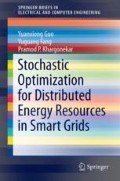Abstract
While the resource optimization of a single smart home is important, the aggregated effect of multiple smart homes is important to the performance of the overall system. In this chapter, we focus on the middle level of the hierarchical architecture: a set of smart homes connected to the same bus forming into a smart neighborhood. In this aggregation level, multiple smart homes are under different ownerships, and a neighborhood energy manager is responsible for coordinating their operations. Specifically, we investigate how to minimize the total energy cost of multiple smart homes in a neighborhood sharing a load serving entity. Specifically, each home has renewable generation, energy storage as well as inelastic and elastic energy loads, and the load serving entity attempts to coordinate the energy consumption of these homes in order to minimize the total energy cost within this neighborhood. We develop an online control algorithm, called LCMA, which jointly considers the energy management and demand response decisions. LCMA only needs to keep track of the current values of the underlying stochastic processes without requiring any knowledge of their statistics. Moreover, a distributed algorithm to implement LCMA is also developed, which can preserve the privacy of individual home owners. Numerical results based on real-world trace data show that our control algorithm can indeed reduce the total energy cost in the neighborhood.
Access this chapter
Tax calculation will be finalised at checkout
Purchases are for personal use only
Notes
- 1.
In this chapter, all power quantities such as r i (t), s i (t), y i (t), d i, 1(t), d i, 2(t) are in the unit of energy per slot, so the energy produced/consumed in time period t are r i (t), s i (t), y i (t), d i, 1(t), d i, 2(t), respectively.
References
Sean Barker, Aditya Mishra, David Irwin, Prashant Shenoy, and Jeannie Albrecht. Smartcap: Flattening peak electricity demand in smart homes. In Proceedings of the IEEE International Conference on Pervasive Computing and Communications (PerCom), 2012.
M. J. Neely. Stochastic Network Optimization with Application to Communication and Queueing Systems. Morgan Claypool, 2010.
Leonidas Georgiadis, Michael J. Neely, and Leandros Tassiulas. Resource allocation and cross-layer control in wireless networks, volume 1. Now Publishers Inc., 2006.
Rahul Urgaonkar, Bhuvan Urgaonkary, Michael J. Neely, and Anand Sivasubramaniam. Optimal power cost management using stored energy in data centers. In ACM International Conference on Measurement and Modeling of Computer Systems, SIGMETRICS 2011, SAN JOSE, June 2011.
Dimitri P. Bertsekas. Dynamic Programming and Optimal Control. Athena Scientific, 2nd edition, 2000.
D. P. Bertsekas and J. N. Tsitsiklis. Parallel and Distributed Compuation. Old Tappan, NJ (USA); Prentice Hall Inc., 1989.
Stephen P. Boyd and Lieven Vandenberghe. Convex optimization. Cambridge University Press, 2004.
D.P. Palomar and M. Chiang. A tutorial on decomposition methods for network utility maximization. Selected Areas in Communications, IEEE Journal on, 24(8):1439–1451, 2006.
Privacy on the Smart Grid, IEEE Spectrum.
NREL: Measurement and Instrumentation Data Center.
Author information
Authors and Affiliations
Appendix
Appendix
3.1.1 The Worst-case Delay for Buffered Elastic Loads
Here we prove Lemma 3.1.
Proof
For all households i, consider any slot t for which d i, 2(t) > 0. We will show that this energy load d i, 2(t) is served on or before time slot t + δ i max by contradiction. Suppose not, then during slots τ ∈ {t + 1, …, t + δ i max}, it must be that Q i (τ) > 0. Otherwise, the energy load d i, 2(t) would have been served before τ. Therefore, 1 Q(τ) > 0 = 1, and from the update Eq. (3.25) of Z i (t), we have for all τ = {t + 1, …, t + δ max }:
Summing the above over τ = {t + 1, …, t + δ i max} yields:
Rearranging the terms and using the facts that Z i (t + 1) ≥ 0 and Z i (t + δ i max + 1) ≤ Z i max yields:
Since the energy loads d i, 2(t) are queued in a FIFO manner and Q i (t + 1) ≤ Q i max, it would be served on or before time t + δ i max whenever there are at leat Q i max units of energy served during τ ∈ {t + 1, …, t + δ i max}. Since we have assumed that the energy loads d i, 2(t) are not served by time t + δ i max, it must be that \(\sum _{\tau =t+1}^{t+\delta _{i}^{max} }y_{i}(\tau )\) < Q i max. Comparing this inequality with (3.41) yields:
which implies that δ i max < (Q i max + Z i max)∕ɛ i , contradicting the definition of δ i max in (3.26).
Rights and permissions
Copyright information
© 2017 The Author(s)
About this chapter
Cite this chapter
Guo, Y., Fang, Y., Khargonekar, P.P. (2017). Decentralized Coordination of Energy Consumption for Smart Neighborhoods. In: Stochastic Optimization for Distributed Energy Resources in Smart Grids. SpringerBriefs in Electrical and Computer Engineering. Springer, Cham. https://doi.org/10.1007/978-3-319-59529-0_3
Download citation
DOI: https://doi.org/10.1007/978-3-319-59529-0_3
Published:
Publisher Name: Springer, Cham
Print ISBN: 978-3-319-59528-3
Online ISBN: 978-3-319-59529-0
eBook Packages: Computer ScienceComputer Science (R0)

